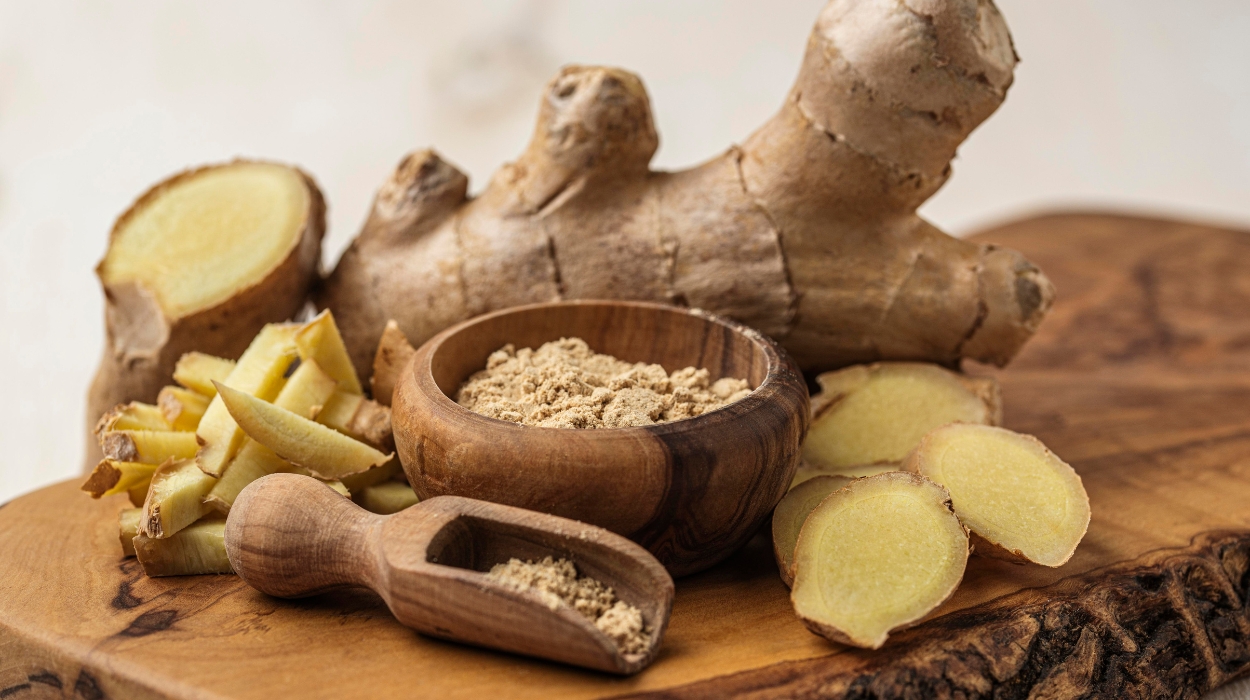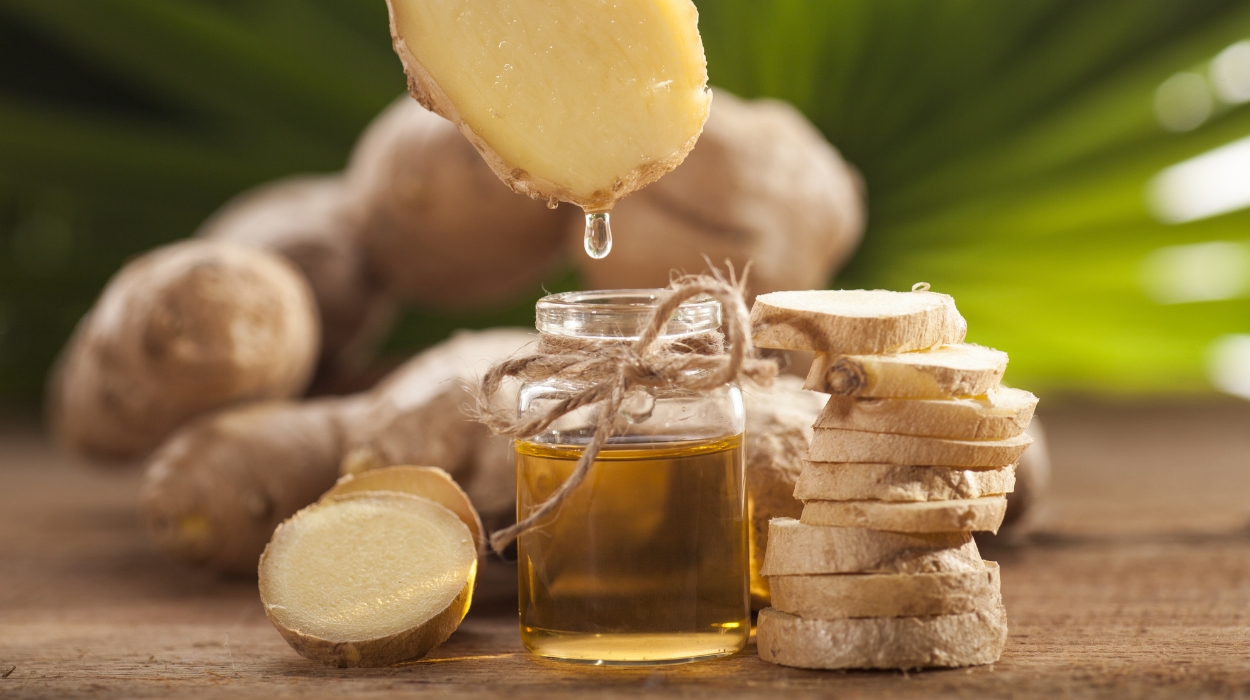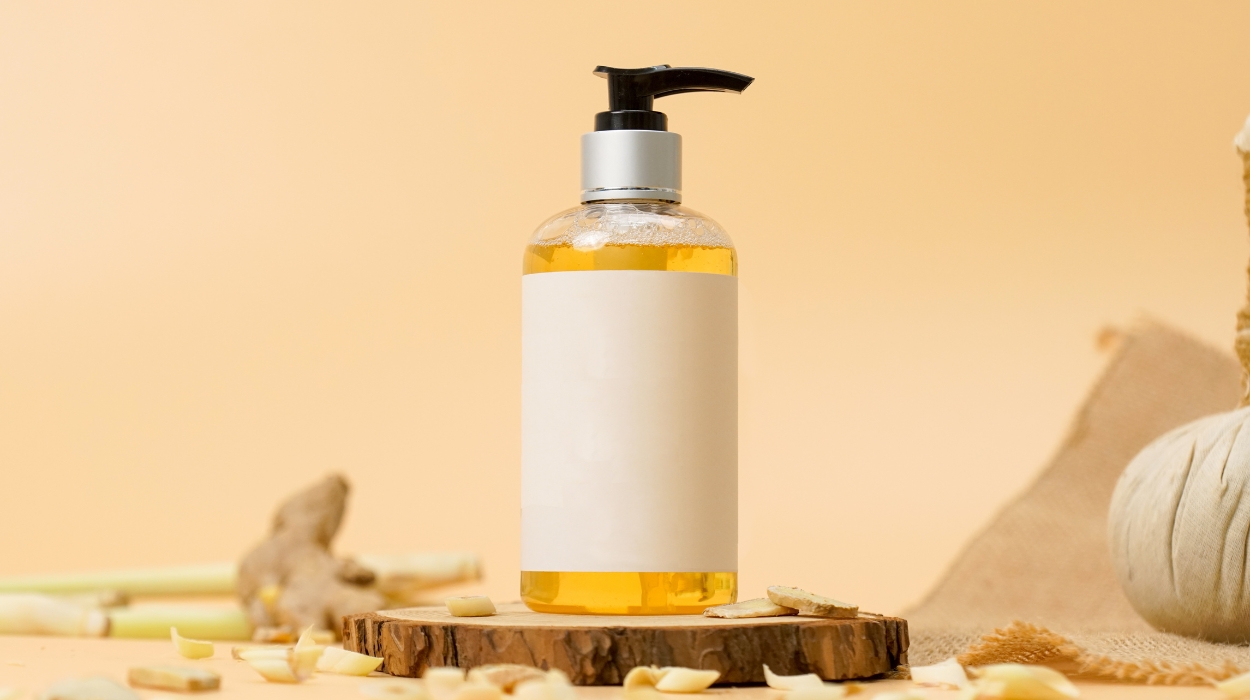 Expert's opinion
Expert's opinion
Expert's opinion
The article is a subjective view on this topic written by writers specializing in medical writing.
It may reflect on a personal journey surrounding struggles with an illness or medical condition, involve product comparisons, diet considerations, or other health-related opinions.
Although the view is entirely that of the writer, it is based on academic experiences and scientific research they have conducted; it is fact-checked by a team of degreed medical experts, and validated by sources attached to the article.
The numbers in parenthesis (1,2,3) will take you to clickable links to related scientific papers.
7 Benefits Of Ginger For Hair Growth: 2024 Tips For Healthier Hair

Healthy hair isn’t just about keeping it healthy with hair care products but also caring for the cells and hair follicles that promote hair growth.
To prevent loss of hair, you need to nourish your hair from the inside out.
Hair is made mainly of the protein keratin, the same protein that makes nails and part of the formation of skin that protects the body.
Scalp health is reliant on skin health; the scalp is made up of cells that depend on a good source of essential nutrients to be in balance and functioning well.
Foods containing these essential nutrients are even considered superfoods for hair, including ginger. Ginger is a plant where the root has been used for many years as a spice and its possible medicinal benefits.[1]
Read on for the benefits of ginger for promoting hair growth.
Amazing Ginger Benefits For Hair
Benefits Of Ginger For Hair Growth

Slows Hair Loss
No one wants brittle hair, hair loss, or hair thinning. Fortunately, ginger might help slow hair loss.
Most accounts, however, are anecdotal — there is limited research that indicates that ginger does slow down hair loss. However, there is an older study from 2013 that indicates ginger can potentially have the opposite desired effect[2] and cause hair growth inhibition.
But that doesn’t mean ginger can’t be a remedy for hair-related issues.
Promotes Hair Growth
A more recent study on ginger hair growth shampoo with ginger and finasteride — a medicine also known as Propecia; It’s often used to help men with male pattern hair loss. This study states that this combination is an effective treatment for men that can improve alopecia symptoms, prevent hair loss, help the hair growth cycle, and control dandruff.
There is a promise that this modulates hair growth, but it still leaves us with the need for more in-depth studies on ginger.
Further research can give us a clearer picture of how ginger can help slow hair loss and the promotion of hair growth.
Manages Oxidative Stress
Antioxidants[3] are important to help manage oxidative stress in the body, known as an imbalance between free radicals and antioxidants. Having readily available antioxidants can help balance these free radicals and prevent damage to cells and therefore prevent damage to tissues of the body and organs.
Antimicrobial Effects
Extraction and use of ginger essential oils[4] have been used for many of their benefits, one of them being related to its antimicrobial benefits. Recent studies have shown that some plant essential oils, like ginger, can inhibit the growth and multiplication of unwanted microbes.
Anti-inflammatory Effects
There is much research on ginger’s anti-inflammatory effects, specifically the main bioactive compound, gingerol. Most recently, it was noted that sun-dried ginger products[5] could enhance ginger’s anti-inflammatory effects. But, it might affect other ingredients’ potency in the ginger.
Antinausea Effects
Have you ever heard people on a boat or plane ask for ginger ale to help manage nausea? While ginger ale soda may or may not be effective, ginger itself can be.
There are some studies on the use of ginger supplements[6] on cancer patients with promising results on improved chemotherapy-induced nausea-related quality of life.
Anticancer Effects
Cancer research[7] is ever-evolving and scientific evidence has shown that ginger may have anticancer effects. There are currently ongoing clinical trials against several different types of cancer.
Why Is Ginger So Great For Your Hair?
Many cultures have long used ginger; it’s often used as a traditional home remedy for digestive issues, cough, and cold problems.
Ginger contains several essential nutrients,[8] antioxidants, and antimicrobial properties that make it an ideal and generally recognized safe-to-consume ingredient.
The key role of ingredients found in ginger which contribute to healthy hair shaft growth and cell health help you get thicker hair.
Luckily, you don’t have to start chewing on ginger roots to get the benefits.
You can find it in east asian cuisines or add it to almost any dish for a flavorful kick. For example, there are ginger-cashew chicken salad, ginger salmon with cucumber lemon sauce, or ginger-chutney shrimp stir fry.
You can also make sauces and eas with just regular honey and freshly chopped ginger.
But is ginger also good for hair growth? Read on for the effects of ginger on hair.
How To Use Ginger For Hair Growth

There are many ways to use ginger. You can consume it as fresh ginger root in cuisine or teas, drink it as ginger juice, grated ginger, and ginger supplements.
You can also apply it topically through ginger oil, extracts, and shampoos.
Consuming ginger as a hair supplement could also provide a moderate amount of nutrients that can contribute to keeping the scalp healthy.
Ginger Hair Mask
You can apply ginger oil, ginger juice, or even ginger puree on your hair or entire scalp. You could even add a carrier oil for extra nourishment and shine, like coconut oil or argan oil.
Some recipes say a scalp massage after you add ginger can help since it increases blood flow[9] and nutrient absorption. You can do a mask once or twice a week, making sure you stimulate the scalp and rinsing the ingredients off.
Keep in mind that a hair care routine is unique, and the mixture of ingredients isn’t scientifically tested unless it’s the shampoo mentioned previously. Applying a ginger mix directly to your hair doesn’t have any negative side effects noted — it also doesn’t have strong research saying it’ll work. But you can always try it.
Side Effects Of Applying Ginger On Scalp
Like any food, the Food and Drug Administration monitors its safety; according to the FDA, ginger is generally considered safe.[10] But it doesn’t mean that it’s harmless altogether; it does come with some aspects that are important to note.
Ginger may have a negative interaction with some medications.[11] Being on an anticoagulant and taking ginger can cause an increased risk of bleeding. The use of ginger can also lower blood sugar, and if a person is on diabetic medication, that can affect the sugar levels. Lastly, ginger can also lower blood pressure. So if you’re on blood pressure medication, it can increase the risk of decreasing your blood pressure even more.
The Takeaway
So, is ginger good for your hair?
Although anecdotally, ginger is said to help with hair regrowth or minimize the symptoms of thinning hair, the reality is that these methods don’t have much research to support it.
Even if using an at-home treatment and doing a massage on your scalp using ginger, it does not guarantee that your hair will grow, has overnight results, or be helpful. But it can improve your nutrient intake and help you stay rich in vitamins and minerals.
There are, however, plenty of studies that indicate that ginger and its nutrients can contribute to much more than hair, and that’s why it’s a superfood. It can help with inflammation, nausea, possibly cancer, and overall health. Plus, it’s simple, tasty, and easy to use — so why not give it a try?
+ 11 sources
Health Canal avoids using tertiary references. We have strict sourcing guidelines and rely on peer-reviewed studies, academic researches from medical associations and institutions. To ensure the accuracy of articles in Health Canal, you can read more about the editorial process here
- Bode, A.M. and Dong, Z. (2022). The Amazing and Mighty Ginger. [online] Nih.gov. Available at: https://www.ncbi.nlm.nih.gov/books/NBK92775/
- Miao, Y., Sun, Y., Wang, W., Du, B., Xiao, S. e, Hu, Y. and Hu, Z. (2013). 6-Gingerol Inhibits Hair Shaft Growth in Cultured Human Hair Follicles and Modulates Hair Growth in Mice. PLOS ONE, [online] 8(2), pp.e57226–e57226. doi:https://doi.org/10.1371/journal.pone.0057226.
- Alves, M., Germana Silva Vasconcelos, Nádia, C., Macedo, D. and Mendes, M. (2019). Consequences of Ethanol Exposure on Neurodevelopment. Elsevier eBooks, [online] pp.47–55. doi:https://doi.org/10.1016/b978-0-12-813125-1.00006-4.
- Muhammad Talib Kalhoro, Zhang, H., Ghulam Mujtaba Kalhoro and Nabi, F. (2022). Fungicidal properties of ginger (Zingiber officinale) essential oils against Phytophthora colocasiae. [online] ResearchGate. Available at: https://www.researchgate.net/publication/358462557_Fungicidal_properties_of_ginger_Zingiber_officinale_essential_oils_against_Phytophthora_colocasiae.
- Mustafa, I., Nyuk Ling Chin, Sharida Fakurazi and Arulselvan Palanisamy (2019). Comparison of Phytochemicals, Antioxidant and Anti-Inflammatory Properties of Sun-, Oven- and Freeze-Dried Ginger Extracts. Foods, [online] 8(10), pp.456–456. doi:https://doi.org/10.3390/foods8100456.
- Marx, W., McCarthy, A.L., Ried, K., McKavanagh, D., Vitetta, L., Sali, A., Lohning, A. and Isenring, E. (2017). The Effect of a Standardized Ginger Extract on Chemotherapy-Induced Nausea-Related Quality of Life in Patients Undergoing Moderately or Highly Emetogenic Chemotherapy: A Double Blind, Randomized, Placebo Controlled Trial. Nutrients, [online] 9(8), pp.867–867. doi:https://doi.org/10.3390/nu9080867.
- Nafees, S., Md. Zafaryab, Mehdi, S.H., Zia, B., Rizvi, M.A. and Md. Asad Khan (2021). Anti-Cancer Effect of Gingerol in Cancer Prevention and Treatment. Anti-cancer Agents in Medicinal Chemistry, [online] 21(4), pp.428–432. doi:https://doi.org/10.2174/1871520620666200918100833.
- M. Hesam Shahrajabian, Sun, W. and Cheng, Q. (2019). Clinical aspects and health benefits of ginger (Zingiber officinale) in both traditional Chinese medicine… [online] ResearchGate. Available at: https://www.researchgate.net/publication/332631596_Clinical_aspects_and_health_benefits_of_ginger_Zingiber_officinale_in_both_traditional_Chinese_medicine_and_modern_industry.
- Koyama, T., Kobayashi, K., Hama, T., Murakami, K. and Ogawa, R. (2016). Standardized Scalp Massage Results in Increased Hair Thickness by Inducing Stretching Forces to Dermal Papilla Cells in the Subcutaneous Tissue. Eplasty, [online] 16, p.e8. Available at: https://www.ncbi.nlm.nih.gov/pmc/articles/PMC4740347/.
- Ecfr.gov. (2024). 21 CFR Part 182 — Substances Generally Recognized as Safe. [online] Available at: https://www.ecfr.gov/current/title-21/chapter-I/subchapter-B/part-182.
- Rubin, D., Patel, V. and Dietrich, E. (2019). Effects of Oral Ginger Supplementation on the INR. Case Reports in Medicine, [online] 2019, pp.1–2. doi:https://doi.org/10.1155/2019/8784029.



